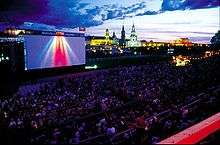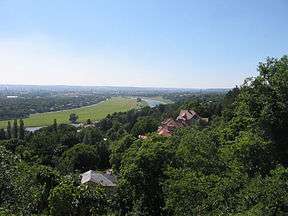Dresden Elbe Valley
| Dresden Elbe Valley | |
|---|---|
|
View to Dresden city centre | |
| Location | Dresden Basin, Germany |
| Long-axis direction | Northwest-Southeast |
| Long-axis length | 20 kilometres (12 mi) |
| Geography | |
| Coordinates | 51°02′59″N 13°48′48″E / 51.04972°N 13.81333°ECoordinates: 51°02′59″N 13°48′48″E / 51.04972°N 13.81333°E |
| Population centers | Dresden |
| Watercourses | Elbe |
Former UNESCO World Heritage Site | |
| Type | Cultural |
| Criteria | ii, iii, iv, v |
| Designated | 2004 (28th session) |
| Reference no. | 1156 |
| Region | Europe and North America |
| Delisted | 2009 (33rd session) |
The Dresden Elbe Valley is a cultural landscape and former World Heritage Site stretching along the Elbe river in Dresden, the state capital of Saxony, Germany. The valley, extending for some 20 kilometres (12 mi) and passing through the Dresden Basin, is one of two major cultural landscapes along the Central European river Elbe along with the Dessau-Wörlitz Garden Realm downstream.
With respect to its scenic and architectural values, including the Dresden urban area as well as natural river banks and slopes, the Elbe Valley was entered on the World Heritage Site list of the UNESCO in 2004. However, in July 2006 it was designated a World Heritage in Danger and finally delisted in June 2009, in the course of the construction of the Waldschlösschen Bridge river crossing.
Description

Points of interest of the Elbe Valley include Pillnitz with its castle and old village as well as the village of Loschwitz with Schloss Albrechtsberg, works of engineering such as the Blue Wonder bridge, the Standseilbahn Dresden and the Schwebebahn Dresden, and the historic center with the buildings of Brühl's Terrace, Semperoper and Katholische Hofkirche (the Roman Catholic Church of the former court). Parts of the area such as Blasewitz are historic suburbs of the city, while there are also industrial districts.
World Heritage status
Plans to build the four-lane Waldschlösschen Bridge across the valley proved controversial. In 2006, the UNESCO World Heritage Committee placed the Dresden Elbe Valley on its list of World Heritage in Danger and threatened to remove it from the World Heritage List. According to the Committee's official website, the committee determined that "plans to build a bridge across the Elbe would have such a serious impact on the integrity of property's landscape that it may no longer deserve to be on the World Heritage List," and therefore decided to place the Dresden Elbe Valley on the List of World Heritage Sites in Danger "with a view to also consider, in a prudent manner, delisting the site from the World Heritage List in 2007 if the plans were carried through."[1]
Though the bridge was approved in a referendum in 2005, the city council decided on 20 July 2006 to stop the invitation to bid on contracts to build the bridge. However, after several court decisions the city was forced to begin building the bridge at the end of 2007 until further court hearings could be held in 2008.
In July 2008, the UNESCO World Heritage Committee decided to keep the Dresden Elbe Valley on the World Heritage List in the hope that the construction would be stopped and the integrity of the landscape restored. If not, the property would be deleted from the World Heritage List in 2009.[2]
In June 2009 at a UNESCO meeting in Seville, the World Heritage Committee decided in a 14 to 5 vote with two abstentions to revoke the Dresden Elbe Valley's status as a World Heritage Site.[3][4]
See also
References
- ↑ ""World Heritage Committee threatens to remove Dresden Elbe Valley (Germany) from World Heritage List," UNESCO World Heritage News, July 11, 2006.
- ↑ "World Heritage Committee keeps Dresden Elbe Valley on UNESCO World Heritage List, urging an end to building of bridge," UNESCO World Heritage News, July 4, 2008.
- ↑ "Unesco-Entscheidung: Dresdner Elbtal verliert Weltkulturerbe-Status," Der Spiegel, June 25, 2009 (German).
- ↑ "Dresden is deleted from UNESCO’s World Heritage List," UNESCO World Heritage News, June 25, 2009.
External links
| Wikimedia Commons has media related to Dresden Elbe Valley. |
